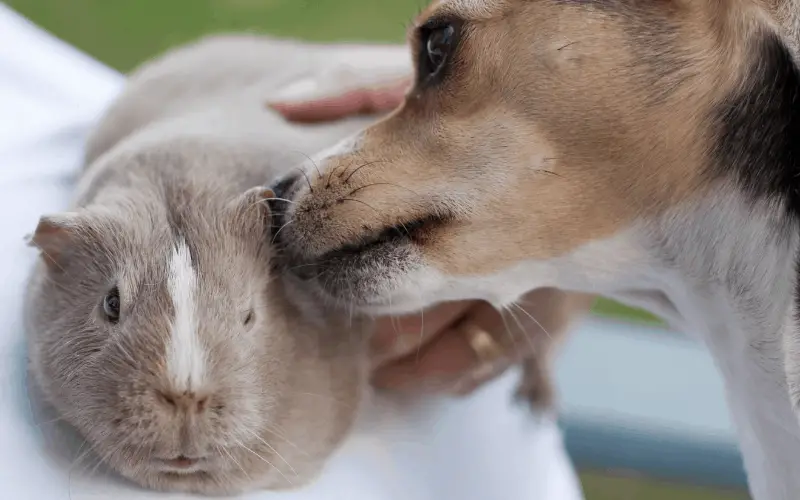Can guinea pigs eat dog food? As a guinea pig owner, you’re probably asking this question. Well, the answer is NO! Guinea pigs are herbivores and cannot digest any form of animal products they eat, such as meats.
Dog foods are often are made from animal products. So, if you have a dog and a guinea pig, you need to make sure that their food is properly separated from each other as they are both different animals that require different diets.
Can Guinea Pigs Eat Dog Food?
No! Guinea pigs cannot eat dog food because of some vital reasons, some of which are listed below:
1. Guinea Pigs Cannot Produce Vitamin C
Like humans, guinea pigs cannot produce vitamin C. This means they need to eat foods that contain vitamin C in order to remain healthy.
Dogs can produce their own vitamin C, so any food that is made for dogs may not contain any vitamin C.
This is the same reason, rabbit food should not make up a large part of a guinea pig’s diet. Because Without the provision of adequate vitamin C, guinea pigs quickly develop scurvy, which could be fatal for your pet
However, it is worth noting that vitamin C depletes over time so If you are feeding your pet guinea pig pellets as a part of their diet as recommended, you should ensure that you throw out any remaining pellets after a couple of months.
Because when the vitamin C in the pellets has depleted, and you continue feeding it your guinea pig, you are basically giving your pig a deficiency!
Also, the required amount of vitamin C a guinea pig needs could double up to 5 times if the guinea pig is sick or pregnant.
2. Guinea Pigs Are Herbivores
Guinea pigs have a digestive system that is designed to digest only plants, so they are unable to digest animal products’ meat.
Dogs on the other hand are carnivores, so processed meat is included in their food. For that reason, when a guinea pig is fed dog food, it can serious digestive problems for them.
Hay which is a vital part of a guinea pig’s diet contains fibers that are necessary for the proper function of a guinea pig’s digestive system. Guinea pigs also do not have the enzymes or acids that are needed to break down meat.
So Even if the meat contains nutrients that a guinea pig needs, they would not be able to breakdown the meat and access the nutrients!
3. No Nutritional Benefits
Meat has no nutritional benefit for a guinea pig; they do not need protein, fat, or calories and meat does not contain fiber which a guinea pig needs. So feeding your guinea pig meat is just like feeding him air, as he gets nothing from it
What Are the Effects of Feeding Meat To Guinea Pigs?

When you fed dog food to your guinea pig which they are not adapted to eat, it will negatively affect their health.
Here are some of the effects of feeding meat to your guinea pig’s health:
1. High Cholesterol
Guinea pigs are highly likely to suffer from heart diseases and like humans, the level of cholesterol they get in their diets and affects their heart health.
So feeding your guinea pig any sort of meat raises their cholesterol level.
2. Obesity
Guinea pigs also suffer from obesity when they are fed a high-calorie diet. This causes them to put on weight which can put serious pressure on the pig’s organs, which also leads to heart disease.
3. Heart Disease
Feeding your guinea pig Saturated fats is bad for the same reasons mentioned above. Guinea pigs have a very sensitive digestive system that cannot digest saturated fats.
So Feeding them a diet that is high in these fats can cause your piggy heart disease.
What To Do When Your Guinea Pig Mistakenly Eats Dog Food
If your guinea pig happened to mistakenly eat some dog food left around its cage, do not panic, here are some steps to take to ensure your pet’s health is not in danger.
Start by taking a photo of the ingredient list from the dog food, and inform your guinea pig’s veterinarian of the situation. the veterinarian will have a better idea of what steps to take in that situation.
Depending on the amount of dog food your guinea pig has eaten, it may require immediate medical attention or you can simply watch it for the next few days. Your vet will tell you what signs to look out for, which indicates potential issues.
What Food To Feed Your Guinea Pig
Now that you know that dog food and other meat products can negatively affect your guinea pig’s health.
What exactly is the right food items to feed a guinea pig. Guinea pigs have different kinds of foods that should make up their diet.
1. Hay
This is the most vital part of any pig’s diet. You should always provide your guinea pig with constant access to hay.
There are different types of hay such as Timothy hay, grass hay, and orchard grass and they are all great choices.
However, legume hays like alfalfa and clover contain a high amount of calcium, protein, and calories, so it should only be fed to guinea pigs who are pregnant or less than 6 months old
Hay is a major part of their diet and also helps to groom a Guinea pig’s teeth, as they have constantly growing teeth they need a constant supply of hay to chew on to help groom their teeth.
Without having something to chew on, a guinea pig’s teeth can overgrow and become crooked which can make it difficult for them to eat.
2. Leafy Greens
Leafy greens are a great source of vitamin C for your guinea pigs. But before feeding any leafy green to your guinea pig you have to make sure it is right for your pet as some types of leafy greens like iceberg lettuce have no nutritional value for guinea pigs, although most other leafy lettuces do.
Leafy greens like kale, rocket, marigold, rosemary, dill, and parsley are all great healthy additions to your pig’s diet. You should feed them at least 2 to 3 leaves per day!
3. Fruit
Fruits are also a great source of vitamin C for a guinea pig but should be fed sparingly to them, and should be more of a treat than a regular part of their diet.
This is due to the high sugar content in fruits, feeding it constantly to your guinea pig could cause them to develop diabetes or cataracts.
You should feed your pig fruit a few times a week. There are a lot of great fruits you can feed your guinea pig including apples (with the seeds taken out) and mango.
4. Vegetables
Guinea pigs also love to munch on vegetables like cauliflower, broccoli, cabbage, and brussels sprouts. It is even recommended that they are made a part of a guinea pig’s diet. But like with fruits, you should only feed them vegetables a few times a week.
This is because although vegetables are a great source of vitamin C, it should not replace hay which should make up about 80% of your guinea pig’s diet.
What Else Can Guinea Pigs Eat?
If you are looking for more information, walkthroughs and troubleshooting about Guinea Pigs and their diet, here are some additional posts you can check out:
Conclusion
Many dog foods and treats all contain some type of animal products that when given to your guinea pigs whose stomachs were designed to digest only plants-based products; affect your pet’s health.
It can cause lots of digestive problems for your guinea pig, which may require immediate medical attention. So, if you have some leftover dog food and you are wondering whether guinea pigs can eat dog food, the answer is no!
Kaytee All Natural Timothy Hay

Kaytee feeds more hay to small pets than anyone else. We pride ourselves on providing fresh, tasty, all-natural hay. Grown specifically for small animals, timothy hay is hand selected to ensure long fiber strands and a proper leaf to stem ratio to support your small pet’s digestive health.
Product SKU: B079RR6CC3
Product Brand: Kaytee All Natural Timothy Hay
4.7
Pros
- Good value for the price
- Fresh and green, smells great
Cons
- It contains little dusty and smaller pieces
- Inconsistent that some have poor quality hay
Small Pet Select Orchard Grass Hay

This hay is hand selected using only the very best quality with rabbits, guinea pigs, and chinchillas. Small pet select searches long and hard specifically for the highest quality orchard hay for rabbits, guinea pigs, and chinchillas in the world and deliver it fresh to your door.
Product SKU: B00S6Y8MHU
Product Brand: Small Pet Select Orchard Grass Hay
4.6
Pros
- Fresh, green and fragrantly rich scent
- Reasonable Price
Cons
- Quality of hay vary with dust and small pieces
